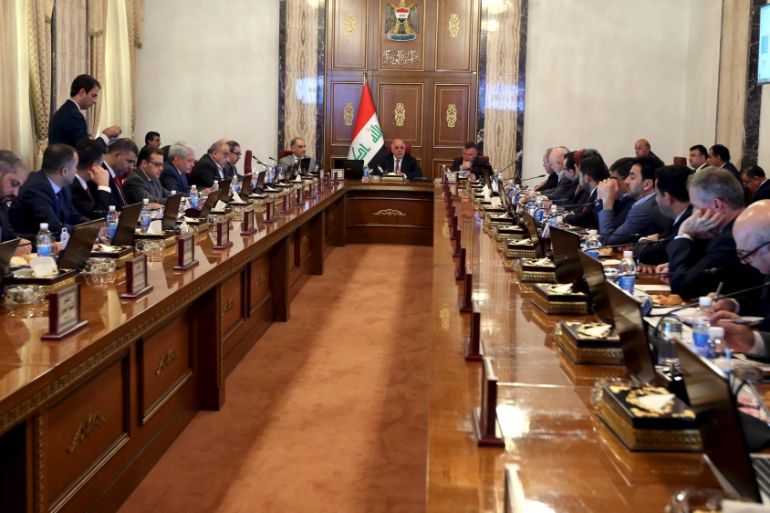Iraq’s prime minister slashes cabinet by one-third
Haider al-Abadi reduces his cabinet from 33 to 22 members as he continues reform plan approved by parliament last week.

Iraq’s Prime Minister Haider al-Abadi has reduced his cabinet from 33 members to 22, as he consolidates the body as part of a major reform push in response to mass protests against corruption and poor governance.
The decision, announced by his office on Sunday, eliminates four ministries, including those of human rights and women’s affairs, while consolidating others.
The move follows a far-reaching reform plan approved by parliament last week that eliminated the country’s three vice presidencies and three deputy prime ministers, as well as reducing the budget for the personal bodyguards of senior officials and transferring it to the interior and defence ministries.
Iraqis have held massive protests in recent weeks against corruption and poor government services, focusing in particular on power outages that have made a recent heat wave even more unbearable.
Iraq’s top Shia cleric, Grand Ayatollah Ali al-Sistani, has lent his support to demands for reform, and parliament unanimously approved the wider reform plan last week in a dramatic show of unity for a country plagued by sectarian and political rivalries.
Those reforms dismantled much of the top-heavy government erected in the years after the 2003 US-led invasion that toppled Saddam Hussein.
The three vice presidencies were intended to give equal representation to the country’s Shia majority and Sunni and Kurdish minorities.
hhhh
Iraq is struggling to roll back fighters from the Islamic State of Iraq and the Levant (ISIL), who swept across the border from Syria last summer and seized around a third of the country, including Iraq’s second largest city, Mosul.
An investigation by a parliamentary committee, presented to the speaker of the parliament on Sunday, found that former prime minister Nouri al-Maliki and other officials were to blame for allowing ISIL to overrun Mosul last year.
ISIL launched an offensive on June 9 last year, overrunning Iraq’s second city the next day and then sweeping through large areas north and west of Baghdad.
Maliki, who lost his position of vice president when it was abolished last week, is widely viewed as having exacerbated sectarian tensions between the country’s Shia majority and its Sunni minority.
Widespread discontent among Sunnis, who say they were marginalised and targeted by Maliki’s government, played a major role in aggravating the security situation in Iraq, aiding the ISIL advances.
Maliki is also accused of appointing commanders based on personal loyalty rather than competence.
In May, ISIL seized Ramadi, the capital of Anbar province after government forces, who had held out against the fighters there for more than a year, fled from the armed group.
Abadi on Sunday announced that he had cleared the way for the military prosecution of senior commanders responsible for the military collapse in Ramadi.
On Sunday, ISIL carried out an attack against Iraqi forces outside the city of Fallujah, west of Baghdad, killing at least 15 soldiers, according to army officers.
In a seperate attack in Baiji in Salahuddine province, ISIL also launched an attack on Iraqi soldiers killing several troops, the commander of operations in Salahuddine province said.